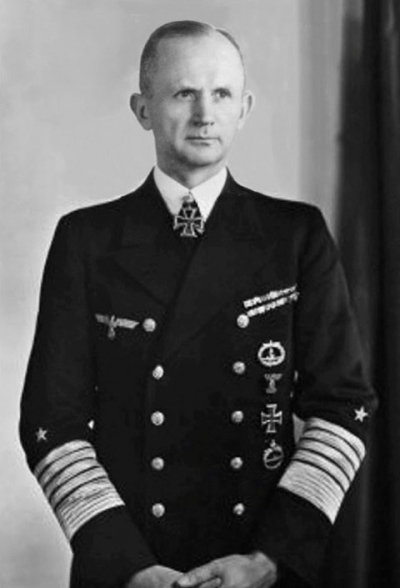Operation Hannibal was a German naval operation involving the evacuation by sea of German troops and civilians from the Courland Pocket, East Prussia, West Prussia and Pomerania from mid-January to May 1945 as the Red Army advanced during the East Prussian and East Pomeranian Offensives and subsidiary operations. The operation was one of the largest evacuations by sea in history.
Karl Dönitz (sometimes spelled Doenitz; German: [ˈdøːnɪts] (listen); 16 September 1891 – 24 December 1980) was a German admiral who briefly succeeded Adolf Hitler as head of state in May 1945, holding the position until the dissolution of the Flensburg Government following Germany's unconditional surrender to the Allies days later. As Supreme Commander of the Navy beginning in 1943, he played a major role in the naval history of World War II. He was convicted of war crimes at the Nuremberg trials in 1946.He began his career in the Imperial German Navy before World War I. In 1918, he was commanding UB-68, and was taken prisoner of war by British forces. While in a POW camp, he formulated what he later called Rudeltaktik ("pack tactic", commonly called "wolfpack").
By the start of the Second World War, Dönitz was supreme commander of the Kriegsmarine's U-boat arm (Befehlshaber der Unterseeboote (BdU)). In January 1943, Dönitz achieved the rank of Großadmiral (grand admiral) and replaced Grand Admiral Erich Raeder as Commander-in-Chief of the Navy. Dönitz was the main enemy of Allied naval forces in the Battle of the Atlantic. From 1939 to 1943 the U-boats fought effectively but lost the initiative from May 1943. Dönitz ordered his submarines into battle until 1945 to relieve the pressure on other branches of the Wehrmacht (armed forces). 648 U-boats were lost—429 with no survivors. Furthermore, of these, 215 were lost on their first patrol. Around 30,000 of the 40,000 men who served in U-boats perished.On 30 April 1945, after the suicide of Adolf Hitler and in accordance with his last will and testament, Dönitz was named Hitler's successor as head of state, with the title of President of Germany and Supreme Commander of the Armed Forces. On 7 May 1945, he ordered Alfred Jodl, Chief of Operations Staff of the Oberkommando der Wehrmacht (OKW), to sign the German instruments of surrender in Reims, France. Dönitz remained as head of the Flensburg Government, as it became known, until it was dissolved by the Allied powers on 23 May.
By his own admission, Dönitz was a dedicated Nazi and supporter of Hitler; he held anti-Semitic beliefs and insisted that Kriegsmarine officers adhere to his political views. Following the war, Dönitz was indicted as a major war criminal at the Nuremberg trials on three counts: conspiracy to commit crimes against peace, war crimes, and crimes against humanity; planning, initiating, and waging wars of aggression; and crimes against the laws of war. He was found not guilty of committing crimes against humanity, but guilty of committing crimes against peace and war crimes against the laws of war. He was sentenced to ten years' imprisonment; after his release, he lived in a village near Hamburg until his death in 1980.

1945Jan, 23
World War II: German admiral Karl Dönitz launches Operation Hannibal.
Choose Another Date
Events on 1945
- 23Feb
Manila
World War II: The capital of the Philippines, Manila, is liberated by combined Filipino and American forces. - 23Feb
History of Poland (1939-45)
World War II: Capitulation of German garrison in Poznań. The city is liberated by Soviet and Polish forces. - 25Feb
Turkey
World War II: Turkey declares war on Germany. - 9Mar
Atomic bombings of Hiroshima and Nagasaki
World War II: The first nocturnal incendiary attack on Tokyo inflicts damage comparable to that inflicted on both Hiroshima and Nagasaki five months later. - 30Aug
Douglas MacArthur
The Supreme Commander of the Allied Forces, General Douglas MacArthur lands at Atsugi Air Force Base.

 English
English  español
español  français
français  português
português  русский
русский  العربية
العربية  简体中文
简体中文 